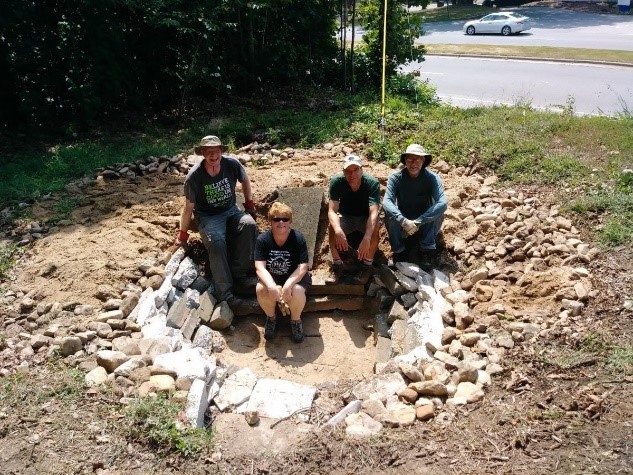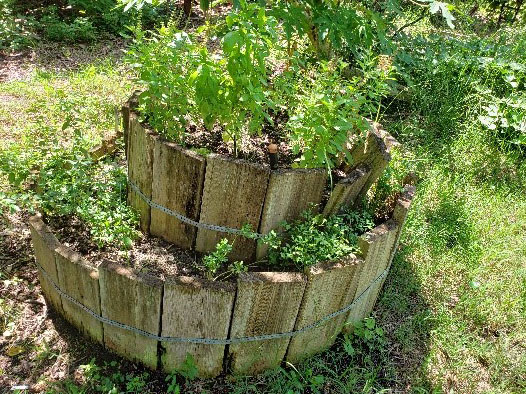Permaculture as a Climate Resilience Strategy

When the UCC’s Council for Climate Justice issued “A Kairos Call to Action: 10-Years of Church Mobilization on Climate and Inequality,” a number of strategies for congregations to investigate and pursue are listed in seeking to “cultivate gardens, landscapes, and appetites in the struggle for justice.” One of the strategies for capturing carbon through the church’s landscape is “permaculture gardening.” “Permaculture” is a word that can baffle or sound off-putting. The word comes from “permanent” and “culture,” suggesting we are on a journey to recover ancient practices of living with one another and creation rather than in exploitation for short- term gain.
An Ethic of Equity
For people of faith, its ethic of “people care – earth care – fair share” can be helpfully integrated into theological understandings of our relationship with each other and creation and jibe with spiritual practices. “Fair share” emphasizes an equitable distribution of resources for today’s communities and those of the future.
The ethic focuses on where we as individuals and communities can be part of small-start, practical solutions to the climate crisis. It is meant to create energy, imagination, spirituality, and humility for our efforts to address critical policy and economic changes.
Many communities of faith across the globe have turned to aspects of this hands-on ethic in order to learn from nature, decolonize from deeply embedded dualistic thinking and acting, build cross-cultural and intergenerational relationships, and serve their wider communities. Growing food means building just communities and healthier ecosystems.
Restoring Land & Community
Often these projects reclaim parcels of land that have been spent or poisoned in urban and suburban neighborhoods. They may create job opportunities for young people, returning citizens, and others passionate about re-creating more livable community. They spotlight local histories of racial and economic violation and work toward repair.
The international journal “Permaculture Magazine” states, “Permaculture encourages us to be resourceful…. It is not a dogma or a religion but an ecological design system which helps us find solutions to the many problems we face – both locally and globally.”
The recently updated report of the Project Drawdown (drawdown.org) outlines top strategies for addressing the climate crisis. Among the most critical strategies is the category “Food, Agricultural Practices, and Land Use,” since 24% of the heat-trapping greenhouse gases come from this sector. Among the specific strategies, plant-rich diets, regenerative food production, and use of trees in food production each dove-tail with this design system.
Food Production in Relationship with Creation

There is a strong movement right now to create climate victory gardens. Methods that make these efforts carbon-capturing are shared with permaculture ideas. These methods include noticing the conditions of a site before deciding what to grow there; promoting diversity by companion planting; attracting pollinating insects with flowering plants; using perennials when possible; capturing soil, water, and nutrients; using cover crops in the off-season; and including woody plants like trees and shrubs to protect from wind and pollution drift and stabilize the soil.
One of the key ways churches can engage these ideas is to support development of community food forests. These forests are planned public spaces for people to work together in creating a place to not only grow food, but share lives, develop outdoor gathering space, attract wildlife, and learn new cultural food ways from each other. With food forests we learn how to work with nature’s succession and inherent wisdom rather than against it. This can happen on church lots. But churches can also and sometimes more powerfully support wider community efforts for this to happen in public parks, reclaimed neighborhood lots, and school lots. These projects help to reclaim and reimagine the commons.
Food forests work with layers of vegetation. The layers include roots, ground covers, herbs and flowers, shrubs, small trees, larger canopy trees, and vines. The layers mimic those of an actual forest: building the soil, working with sunlight and shade, and planting many perennials that support one another in communities of mutuality.
Food forests, community gardens, and assistance in developing church members’ gardens can play a role in addressing food justice in communities that are food deserts devoid of grocery stores. Jesus fed people who were hungry not only for God’s word but also for bread. Helping people to grow food for their hungry families is both nourishing and empowering.
Holistic Thinking & Acting
Gardening is merely one aspect of permaculture’s scope. It designs the way we live: how we create and save energy; imagine our living spaces, neighborhoods, and transportation; save water; work with waste; rethink our economy and our livelihoods; and strengthen our family and local community connections.
 So many of us in congregational life right now look at the many strategies to address climate crisis and then look at our financial resources and say, “But we cannot afford to do that – put up solar panels, purchase a composting service, create large perennial gardens, buy eco-friendly appliances, etc.” The permaculture ethic encourages shifting our gaze to where there is abundance and resources, to start small with what we have. One of the mottos is “Often the problem is the solution.” Rather than look at an area that is full of shade and say, “We can’t grow tomatoes,” instead we say, “That’s the perfect place to put some mushroom logs.” Rather than say, “There’s too much water coming off the church parking lot to do anything there,” “we say, “Let’s build a bowl of rocks and capture all that water and nutrients.” If we observe our environment with attention and humility, it often provides its own solution. This is perhaps one of the greatest threats to the status quo economy: we build our own small but powerful resilience by improvising, repurposing materials, getting to know the skills and stories of our neighbors, and making connections with other organizations to get something done.
So many of us in congregational life right now look at the many strategies to address climate crisis and then look at our financial resources and say, “But we cannot afford to do that – put up solar panels, purchase a composting service, create large perennial gardens, buy eco-friendly appliances, etc.” The permaculture ethic encourages shifting our gaze to where there is abundance and resources, to start small with what we have. One of the mottos is “Often the problem is the solution.” Rather than look at an area that is full of shade and say, “We can’t grow tomatoes,” instead we say, “That’s the perfect place to put some mushroom logs.” Rather than say, “There’s too much water coming off the church parking lot to do anything there,” “we say, “Let’s build a bowl of rocks and capture all that water and nutrients.” If we observe our environment with attention and humility, it often provides its own solution. This is perhaps one of the greatest threats to the status quo economy: we build our own small but powerful resilience by improvising, repurposing materials, getting to know the skills and stories of our neighbors, and making connections with other organizations to get something done.
It shifts our focus to the low-key, little-funded, enjoyable ways we make a difference, often especially at the edges, the marginal spaces. Because the edges–of the garden, the lot, the neighborhood, our congregation–are the places with the most life, diversity, and energy. Being on the edges will teach us our next steps. Jesus of Nazareth lived and celebrated on the edges in order to cultivate a more abundant way. Making mistakes, adapting, and observing the natural world inspire our way with others in human community. We focus more on the assets of community, rather than the problems.
Both the Church and the global movement of permaculture are in the process of learning to critique their own values. Often permaculture has repackaged the ancient indigenous wisdom of living more symbiotically with the natural world into a philosophical system promulgated mostly by those of European descent and mostly men. It is essential to give credit to ancient wisdom, the long-held ways of native communities and other People of Color, and women, who have mostly been those who pass down the wisdom of patterns, food ways, and organizing living spaces. May there be a great convergence of proper acknowledgment, equitable redistribution of resources, and spiritual and practical efforts as we create local restorative communities with churches as essential partners.
Authors: The Rev. Craig Schaub is the Pastor of Parkway United Church of Christ in Winston-Salem, North Carolina. The Rev. Meighan Pritchard is the pastor of Prospect Congregational United Church of Christ in Seattle, Washington.
Related News
Walking the Talk: Environmental Practices and a Commitment to Justice
St. James United Church of Christ in Hamburg, New York (a suburb of Buffalo) has been...
Read MoreThe Antidote to Power from Above
With its themes of moral reckoning and repentance, this Lenten season brings into stark relief...
Read MoreDon’t Incinerate – Innovate!
Thirty-eight years ago, the United Church of Christ's Commission for Racial Justice released a...
Read More


